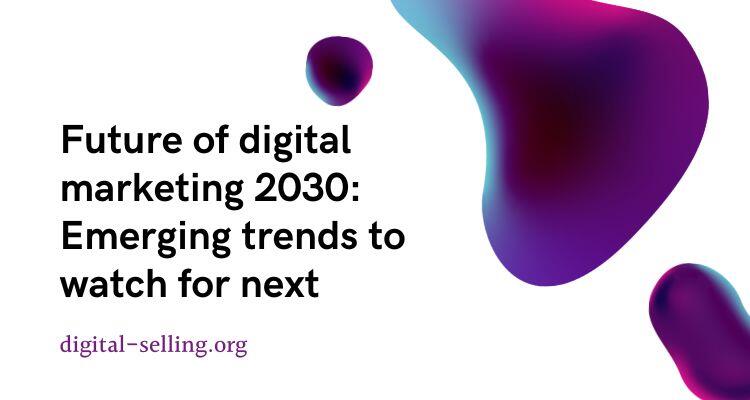The importance of inclusivity and diversity in marketing strategies to connect with diverse audiences in the future of digital marketing 2030.
As we approach 2030, the landscape of digital marketing is set to undergo significant transformations. With rapid technological advancements and a shifting societal landscape, marketers must adapt to new trends and challenges. One of the most critical aspects that will define the future of digital marketing 2030 is the emphasis on inclusivity as well as diversity. These principles will not only shape marketing strategies but also determine the success of brands in connecting with diverse audiences.
Inclusivity and Diversity: Cornerstones of Future Marketing
In the future of digital marketing 2030, inclusivity and diversity will no longer be optional—they will be essential. As global populations become more diverse, brands must ensure their marketing strategies reflect this diversity. This means creating content that resonates with people of different ages, ethnicities, genders, sexual orientations, and abilities.
Why Inclusivity and Diversity Matter
Inclusivity and diversity in marketing are important for several reasons. Firstly, they reflect the real world. As societies become more interconnected and multicultural, audiences expect brands to mirror this diversity. Secondly, inclusive marketing fosters a sense of belonging among consumers, which can lead to stronger brand loyalty and customer retention. Thirdly, diverse perspectives can drive innovation and creativity, leading to more effective and resonant marketing campaigns.
Case Study: Nike’s Inclusive Marketing
A prime example of successful inclusive marketing is Nike’s campaigns, which have consistently highlighted diversity and inclusivity. From featuring athletes of all backgrounds in their advertisements to launching products like the Nike Pro Hijab, Nike has shown that embracing diversity can enhance brand image and connect deeply with consumers.
Emerging Trends Shaping the Future of Digital Marketing 2030
As we look ahead to the future of digital marketing 2030, several emerging trends stand out. These trends will shape how brands approach inclusivity and diversity in their marketing efforts.
1. Personalized Marketing with AI
Artificial Intelligence (AI) will play a crucial role in the future of digital marketing 2030. AI-driven personalization will enable brands to deliver highly customized experiences to their audiences. So, by leveraging data analytics, AI can help marketers understand individual consumer preferences and behaviors, allowing for tailored content that speaks directly to diverse segments of the population.
2. Voice Search and Conversational Marketing
Voice search is becoming increasingly popular, and by 2030, it will be a dominant force in digital marketing. Brands will need to optimize their content for voice search and develop conversational marketing strategies. This means creating inclusive voice interfaces that understand and cater to different accents, languages, and speech patterns.
3. Immersive Technologies: AR and VR
Augmented Reality (AR) and Virtual Reality (VR) will transform the way consumers interact with brands. In the future of digital marketing 2030, these technologies will offer immersive experiences that can be tailored to diverse audiences. For example, AR can enable customers to visualize products in their own environment, while VR can offer virtual store tours that cater to different accessibility needs.
4. Inclusive Content Creation
Creating content that is inclusive means considering the needs and preferences of diverse audiences. This involves using diverse models, inclusive language, and ensuring accessibility in all forms of media. Brands will need to prioritize content that is not only visually inclusive but also accessible to people with disabilities, such as providing alt text for images and captions for videos.
5. Ethical Data Practices
As data privacy concerns grow, ethical data practices will become paramount. In the future of digital marketing 2030, brands will need to be transparent about how they collect and use data. So, ensuring that data collection methods are inclusive and do not discriminate against any group will be critical in building trust with diverse audiences.
6. Social Responsibility and Purpose-Driven Marketing
Consumers are increasingly expecting brands to take a stand on social issues. Purpose-driven marketing, which aligns a brand’s values with societal causes, will be a significant trend in the future of digital marketing 2030. Brands that authentically support diversity and inclusion initiatives will resonate more with socially conscious consumers.
Challenges and Opportunities to the Future of Digital Marketing 2030
While the future of digital marketing 2030 presents exciting opportunities, it also comes with challenges. Brands must navigate the complexities of creating genuinely inclusive marketing strategies. This involves more than just diverse representation in advertisements; it requires a deep understanding of different cultures, experiences, and perspectives.
Overcoming Bias in AI
One of the challenges in the future of digital marketing 2030 will be addressing biases in AI algorithms. These biases can inadvertently perpetuate stereotypes and exclude certain groups. Ensuring that AI systems are trained on diverse datasets as well as regularly audited for bias will be essential.
Ensuring Accessibility
Making digital content accessible to everyone, including people with disabilities, will be crucial. This includes designing websites that are easy to navigate with screen readers, providing transcripts for audio content, and using high-contrast colors for better visibility.
Building Cultural Competence
Marketers will need to build cultural competence—understanding and respecting the nuances of different cultures. This involves continuous learning and collaboration with diverse teams to create content that is both respectful and resonant.
Final words about the Future of Digital Marketing 2030
The future of digital marketing will be defined by inclusivity and diversity. As brands navigate this evolving landscape, those that prioritize these principles in their marketing strategies will be better positioned to connect with diverse audiences and achieve long-term success. By embracing personalized marketing with AI, optimizing for voice search, leveraging immersive technologies, creating inclusive content, adopting ethical data practices, and engaging in purpose-driven marketing, brands can stay ahead of the curve and build stronger, more inclusive connections with their consumers. So, the future of digital marketing 2030 is not just about reaching more people, it’s about reaching people in ways that matter to them.

